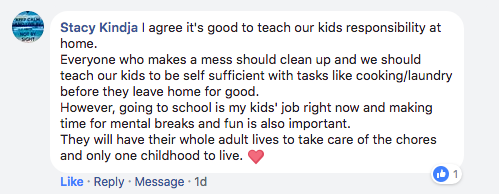Keeping a property tidy is hard enough, let alone when you have one or more children living with you. (Maybe that’s why I stick to fur babies!) Picking up spills, clothes and toys becomes a never-ending chore, that’s found to be an irresponsible practice when paired with shielding children from chores. Do you believe kids should do chores? Or should they just be kids?
One of my favorite chores to do as a kid was dusting and vacuuming the house. My Mom always believed in giving us weekly chores to help not only, teach us responsibility, but show us how to care for “the items” we own. I recently posted this video on my Facebook Page by Parenting Today, which shows the chore debate. The video also highlighted a 2014 Braun Research survey that found while 82-percent of Americans report have regular chores growing up, only 28-percent of parents today require their kids to do chores.
My post got an overwhelming response of parents who provided their “parental advice,” mostly believing that chores are an important part of giving kids’ a sense of well-being.
The Benefit of Child Chores
Research from a Harvard Grant Study showed what psychosocial variables and biological processes like people who did more housework in childhood were happier later in life. The study suggests children who were given chores became more independent adults. Completing the task gives a child a sense of accomplishment and makes them feel more competent.
Nobody is born with cleaning skills–that’s why it’s a parent’s job to teach their child how to clean properly and make it a habitual task. One of the easiest ways to do this is work as a team. By pitching in to clean around the house, the study believes the kids feel apart of a team and can encourage them to be good citizens.
Recruit Family Members to Clean
Have a Plan, Set a Meeting
Create a chore chart to divide responsibilities among household members. What do they need to do daily, weekly, monthly? Then you want to hold a meeting to get everyone on the same page and set expectations to determine who will do what in each room of the house. You want to be able to keep a routine so every day or week so and so is going to do the dishes, fold laundry or whatever the chore is.
All this should be talked about in that initial meeting along with answering this question…how will they know when a cleaning task is complete? Is it when the laundry comes down to the washer, or when the clothes go into the washer or is it when the clothes are folded and put away? When will they know in your eyes their job is complete? Avoid overwhelming your helpers too you don’t want them to lose focus or worse yet never start.
Utilizing Small Hands
Kids can help you around the house by age 2 or 3, so if you teach them young how to clean up and appreciate their belongings and surroundings you’ll be creating good habits they can utilize the rest of their lives. Here are some of the chores kids can do by age 10:
- Make their beds
- Pick up their toys
- Straighten up family and play rooms
- Collect the laundry
- Strip bed linens
- Fold and put away laundry
- Clean up bedroom daily
- Water plants
- Clean up after bath time
- Empty bedroom/bathroom trash cans
- Set and clear dinner table
- Wash, load and put away dinnerware
- Clean up spills
- Dust furniture
- Take care of pets
- Clean sinks
- Bring in groceries
- Vacuum a room
Age-Mindset and Your Expectations
As Patrice is experiencing her four year old daughter is excited to help out. Small children usually want to be involved, so use their enthusiasm to have them help you get more done around the house. As they get older and complete chores, you need to manage your own expectations. Know yourself and don’t get angry if something is not done correctly. Your kids will not want to help out, if you’re micromanaging them, ridiculing them making the task less fun. Instead teach cleaning skills and validate tasks for a job well done. These cleaning skills include getting motivated, being able to follow direction and being detailed oriented.
Do You Reward For Completed Chores?
Another controversial topic the reward system for chores completed in your home. Kim’s response above, shows that fine line between parents deal with about responsibility and being privileged. I loved her idea if you’re going to provide a monetary reward then, you’ll also go to the band to learn how to manage money.
Most parents who responded to my post, don’t give money for a completed task. Instead, they give their kids tech time to play on their phones or electronics. Some also reward them with a family experience, like go get ice cream or movie night.
Just remember, if you’re going to use a reward system, you’ll have to hold all household members accountable by setting reminders, having a cleaning plan, plus clarifying the rewards and consequences if someone doesn’t complete their chores.
Happy Cleaning,







